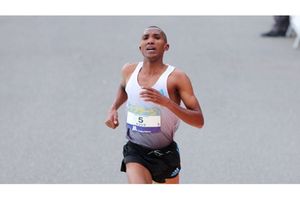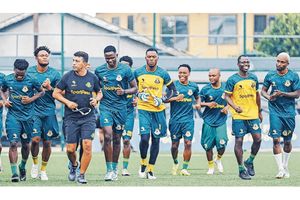President Macky Sall throws Senegal’s democratic credentials into doubt

Senegal's President Macky Sall attends the opening of German pharmaceuticals company BioNtech mRNA vaccine manufacturing plant to serve the African market in Kigali, Rwanda December 18, 2023. PHOTO | REUTERS
What you need to know:
- Senegal’s democratic credentials seemed to be cemented by the fact that none of the presidents succeeded in staying on unconstitutionally.
Senegal’s President Macky Sall announced in early February that presidential elections, originally scheduled for February 25, would be postponed indefinitely.
The announcement has raised fears of popular protests, violent repression, a once democratic president transforming into an authoritarian ruler – and possibly even another coup d’état in West Africa.
There has been a flurry of coups in the region since 2020 – Mali in August that year followed by a second in 2021. Guinea also saw a coup that year and Burkina Faso a year later. In July 2023, the military took control in Niger.
Senegal has never suffered a coup d'etat and has been considered the region’s most stable democracy.
Since independence in 1960 it has had three peaceful transitions of power. First in 1980, from Leopold Senghor to Abdou Diouf; then, in 2000, from Diouf to Abdoulaye Wade; and then, in 2012, from Wade to Sall.
In political science terminology, a democracy is considered consolidated only after a “double turnover”. This is when an opposition party which came to power through democratic elections (the first turnover) itself hands over power to its opposition after losing democratic elections (the second turnover).
I am a political scientist and researcher with an interest in African politics and democracy building. Based on my experience, I believe Senegal is exceptional in west Africa.
The country has enjoyed a “triple turnover” of power through democratic elections. Yet all three of these peaceful democratic transitions were preceded by a crisis with incumbent presidents attempting to remain in office beyond their constitutional mandate.
Senegal’s democratic credentials seemed to be cemented by the fact that none of the presidents succeeded in staying on unconstitutionally.
This track record should be used to evaluate the prospects of a new president coming to office.
A model West African democracy
Over the past four decades Senegal became known for its relatively independent media and free expression. The presidents of Senegal all managed, eventually, to step down from power. This allowed elections to become the only game in town.
Senegal is rated “partly free” by Freedom House in its Freedom in the World 2023 report. The think-tank uses a set of criteria such as political rights and civil liberties to categorise countries as free, partly free and not free.
Senegal scores well in some areas, like academic freedom and individuals’ right to practise and express their faith or non-belief in public.
But it falls down in others, such as restricting people’s right of assembly and violently dispersing some demonstrations.
Although regular elections are held, each one of Senegal’s leaders started off well, then attempted to stay in power longer than the designated time.
Leopold Sedar Senghor became Senegal’s first president after independence in 1960. He came to power on the back of his reputation as an intellectual of the “négritude” movement, as a democratic opponent of French colonialism and someone who had fought for freedom.
But, in 1963, 1968, 1973 and 1978, he staged presidential plebiscites so that he could remain in office.
Then, in December 1980, after 22 years in office, he decided to step down and hand over to his designated successor, Abdou Diouf.
Abdou Diouf had the same temptation. He held on to the presidency until decades of peaceful, principled, democratic opposition led by Abdoulaye Wade forced him to accept his losing bid for re-election in 2000.
Wade served time in prison following a long struggle for power and was forced into exile in Paris. He went on to lead a popular movement that ousted the long-ruling Socialist Party and Diouf.
He promised to clean up the corruption inherent in single-party rule. But towards the end of his second mandate in 2009, he too began to imitate his predecessors.
Wade spent his last years in the presidential palace trying to win a third term. When that did not work, he named his son Karim Wade as his dynastic successor. But Karim Wade was convicted of corruption and his father’s wishes weren’t fulfilled.
Macky Sall of the Alliance for the Republic party came to power in 2012 as an honest, anti-corruption politician. But he too has fallen.
After his re-election in 2019, he named an uncharismatic technocratic prime minister, Amadou Ba, as his number two. This turned his former prime minister Aminata “Mimi” Touré into his opponent. (She is now running for president.)
It also ensured that he would not face a prime minister becoming more popular than himself.
Sall clearly wanted to run for a third term. Yet, he renounced that option in 2023 and endorsed Amadou Ba as his candidate for succession.
The last main opposition candidate left in 2023, after the exclusion of Karim Wade, was Ousmane Sonko. A social media personality, he is sometimes referred to as the “Trump of Senegal” because of his shocking statements, which have endeared him to young Senegalese.
In one instance, he said “those who have ruled Senegal from the beginning deserve to be shot.”
There is also a more serious side to Sonko, a former tax inspector who investigated corruption in the Sall government. He published a book about oil and gas corruption in Senegal which implicated the Sall government.
Sexual assault charges were mounted against him in 2023 and he was imprisoned. This disqualified him from running in the 2024 election. Sonko endorsed Bassirou Diomaye Faye as his replacement.
His supporters have always maintained that the charges were trumped up because of his opposition to the Sall government.
Sonko was acquitted on the rape charge but convicted for “corrupting the youth”. Young people took to the streets in protest, calling Sall a tyrant. Sall used the repressive apparatus of the state to quell the protests.
Then on 4 February, as campaigning was about to begin, in an unprecedented move Sall announced that he was postponing the election indefinitely, citing a dispute over the candidate list.
Protesters and police clashed in Dakar.
Tensions continued to rise. As opposition leaders and supporters launched protests, the government imposed restrictions on access to the internet.
On 5 February, parliamentarians were asked to vote on postponing the election until 15 December.
A long and heated debate ensued. Several opposition lawmakers were forcibly removed from the chamber while the police used tear gas to disperse protesters gathered outside the parliament building.
In the end, the decision to postpone the poll until December was passed with opposition MPs missing. A number were arrested.
What next?
In my view Senegal is a consolidated democracy. It has passed through three peaceful democratic transitions of power from a ruling party to the opposition.
The optics of the present moment are certainly not good. But past experience suggests a new president could still come to office, either from the ruling party or from the opposition.
By Douglas Yates - Professor of Political Science, American Graduate School in Paris (AGS)




